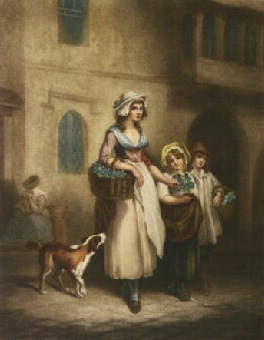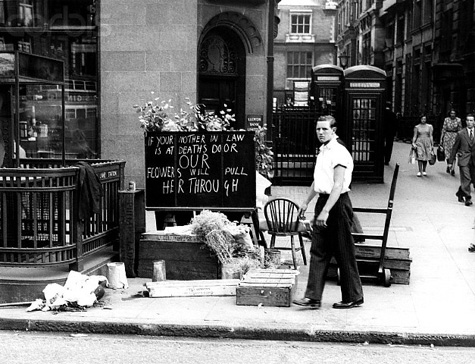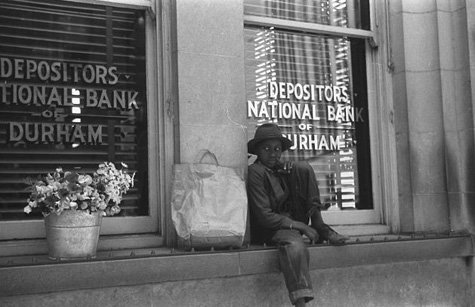Human Flower Project
Flower Vendors, Sing Out!
To Archie Green’s temple of laborlore, we bring another offering: “cries” from the street.

Archie Green
at home on Caselli Ave., San Francisco, 2008
Photo: Shelly Romalis
A month ago, one of my heroes gave out after 91 years. Archie Green died March 22 in San Francisco.
As widely read and thoughtful as anyone I’ve known, Archie stretched over political theory, linguistics, the history of art prints, ethnomusicology, 19th Century American literature…. In conversation, he was precise and boundless, also given to fine eccentricities, like intentionally mispronouncing the singer Madonna’s name – “Ma-dOne-Ah,” with a very long, dopey O.
Archie’s great commission was studying the culture of working people, what he called “laborlore.” From the inception of the Human Flower Project, I tried to get him aboard but never succeeded.
Here, I and others have looked at many dimensions of flower labor. We’ve written about the conditions for fieldworkers in several parts of the world, and tricks of the florists’ trade. We’ve run photographs of New York sweatshops where women made artificial flowers. We even documented the use of flowers in a Montreal labor union’s demonstration. Pushing all these efforts at Archie, I could tell he was never really grabbed by any of it.
 Primrose Seller, from ‘Cries of London,’ painted by F. Wheatly, engraved by Vendramini, c. 1790.
Primrose Seller, from ‘Cries of London,’ painted by F. Wheatly, engraved by Vendramini, c. 1790.
Photo: Primrose Day
Was something about flowers just not muscle-bound enough for a man who had studied coal miners and pile drivers, and been a shipwright himself? (Fieldhands and even florists will tell you differently.) Did giving flowers—like owning pets, which Archie disparaged—strike him as bourgeois? Or did he confound the ephemeral with the trivial, delicacy with elitism?
I’ll never know.
Over the past four weeks I’ve been thinking about what he taught me. Because Archie spent so much effort recording and examining workers’ songs, I went looking for something audible and came upon the music of flower vendors.
Shopowners have signs to draw the public, countertops for doing business, coolers that keep their “product” fresh. Vendors, typically, have just their wares, their bodies and the street.
It’s tough out there, often demeaning. Check out this youtube, shot in Romania – indicative of what flower sellers have to put up with. (I can’t believe someone would “broadcast himself” as such scum.) And here: different guy but more of the same from Glasgow.
In many part of the world, the flower peddlers are children.
Are you watching and listening, Archie?
To advertise – especially in cities and older societies with more open windows – flower vendors have used calls or “cries.”
“Will you buy my sweet primroses,..two bunches a-penny? All a-growing, all a-blowing, who will buy my sweet primroses,…Two bunches a-penny.” So you might have heard on the London streets, c. 1790 (the “growing” were primrose bedding plants—the “blowing,” cut flowers).
A century later Charles Dickens wrote in All Year Round, “We have a large number of street vendors of flowers and their cry ‘Penny a bunch, violets!’” (Inflation? Or were violets scarcer than primroses in London, c. 1885?)
Dickens fondly set down several more flower “cries”:
“’Wall-flowers – sweet wallflowers!’ are not unwelcome; whist the cry of ‘Lavender – sweet lavender!’ reminds us that summer is drawing to a close.” Dickens quotes another writer, unnamed, from early in the 19th Century: “To the east of Temple Bar, the flower-girl is the herald of spring. She cries, ‘Cowslips!’ Then she screams ‘Bow-pots – sweet and pretty bow-pots!’ When I was a child I got a bowpot of as many wallflowers and harebells as I could then hold in my hand, with a sprig of sweetbriar at the back of the bunch, for a halfpenny –such a handful!”
The sing-song “ad,” the wares, and the vendor, too, were head-turners, and the price was right.
Street vendors of Damascus, Syria, have been especially renowned for their wit. “Appease your mother-in-law!”—“Salih hamatak!” called the “hawkers of nosegays.”
According to George Taylor, this snippet of laborlore was picked up by a Baedeker travel writer, and once published, caught on. “Its appeal has been universal,” Taylor wrote. “It has been the starting point for most searchers for the picturesque in street cries. But in 1944, hardly 30 years after Storrs had given ‘Propitiate your mother-in-law’ as his version of the cry, I found not a single flower seller still using it, and after much searching, only one man who even remembered using it.”

Flower seller on a London street:
“If your mother in law is at death’s door, our flowers will pull her through”
Photo: Hulton-Deutch Collection
Damascus flower vendors may have given up “Salih hamatak!” but its enchantment didn’t slip past savvy London flower sellers; at least one adapted it, turning the call into a chalkboard slogan. What is this, Archie, if not “folk marketing 101”?
And in literary New Orleans: “Flores. Flores para los muertos… Corones. Corones para los muertos.” Tennessee Williams added the flower vendor’s eerie call to A Streetcar Named Desire. (“Flowers. Flowers for the dead….”)
One of Archie’s proudest achievements was lobbying for the foundation of an American Folklife Center at the Library of Congress. He took that rock of an idea and rolled it from Illinois to D.C., all the way up Capitol Hill. Both houses of Congress voted unanimously to create the Center in 1976.

Flower vendor, Durham, North Carolina, c. 1940
Photo: Jack Delano, Library of Congress American Memory
Today among thousands of pages on the Center’s website, you can find a bibliography of “Street Cries, Auction Chants, and Carnival Pitches and Routines in recorded collections of the Archive of Folk Culture.”
Here’s one, sung by an “unidentified street vendor,” in Charleston, South Carolina, ca. 1935. (Collected by Walter C. Garwick. Recording Library of Congress. LP album LBC 8, folk Music in America, Vol. 8: Songs of Labor & Livelihood, 1978.)
Listen to it here by clicking the gray arrow:
Yes ma’am I got flowers,
You ask me how I sell ‘em.
Yes ma’am ten cents a bunch, three for a quarter.
Yes ma’am who got the money come and buy,
And who ain’t got the money stand aside and cry,
Flowers to go and buy.
What you all looking after me so for,
I’m not come to stay;
I just come to let you all know,
This one’s the flowers day,
Flowers to go and buy.
I got white lilies, jasmine white,
I got all kinds fresh and fine,
Just off the wine [sic].
Yes ma’am I got flowers.
You ask me how I sell ‘em,
Yes ma’am three for a quarter,
All come and buy now,
‘Cause I’m here today and tomorrow I’ll be gone;
Flowers to go and buy.

A child selling flowers on a highway in Terhan, Iran: Flower Day, June 14, 2008
Photo: Mona Hoobehfekr, for Islamic Society of North America
I wonder how Archie would approach the cry of the flower vendor—maybe as a bit of picaresque, an auditory keepsake for those “who got the money.” The Charleston vendor chanting prices with “yes ma’ams” is a long way from miner’s wife Sarah Ogan Gunning singing: “I hate the capitalist system.” But work, Archie realized, has “many voices”; oppression gives rise to many songs. Defiant, obsequious, flower workers will be our work.
Comments
There will be a memorial for Archie Green on June 21, 1 to 4 pm, at
McKenna Theatre
Creative Arts Building
San Francisco State University
1600 Holloway Ave. San Francisco Ca 94132
Musical tribute will feature Hazel Dickens, Mike Seeger, and Elaine Purkey.
Hosted by the Labor Archives and Research Center
Please rsvp Derek Green at .(JavaScript must be enabled to view this email address)


“All a-blowing” means “all in flower”. Remember your “Midsummer Night’s Dream” where Titania sleeps on a “…bank, where the wild thyme blows”? There’s a direct link back between “blows” and “blossom”, and the word “blowsy” (meaning faded [flowers] or slightly grubby and unkempt [of a room etc].